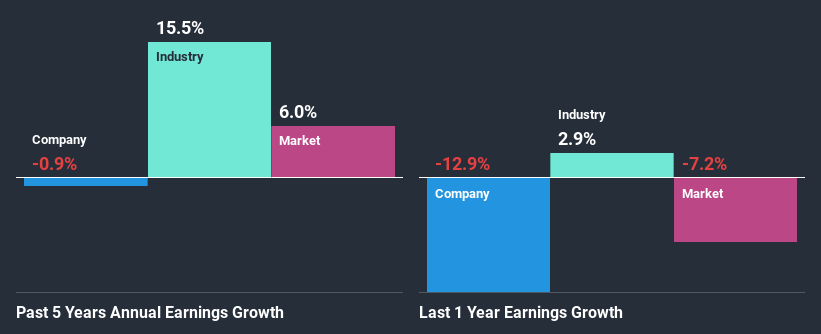- Japan
- /
- Professional Services
- /
- TSE:2479
JTEC Corporation's (TYO:2479) Financials Are Too Obscure To Link With Current Share Price Momentum: What's In Store For the Stock?
JTEC's (TYO:2479) stock is up by 3.7% over the past month. However, the company's financials look a bit inconsistent and market outcomes are ultimately driven by long-term fundamentals, meaning that the stock could head in either direction. Specifically, we decided to study JTEC's ROE in this article.
Return on Equity or ROE is a test of how effectively a company is growing its value and managing investors’ money. In simpler terms, it measures the profitability of a company in relation to shareholder's equity.
See our latest analysis for JTEC
How Is ROE Calculated?
The formula for ROE is:
Return on Equity = Net Profit (from continuing operations) ÷ Shareholders' Equity
So, based on the above formula, the ROE for JTEC is:
6.9% = JP¥58m ÷ JP¥846m (Based on the trailing twelve months to September 2020).
The 'return' is the yearly profit. One way to conceptualize this is that for each ¥1 of shareholders' capital it has, the company made ¥0.07 in profit.
What Is The Relationship Between ROE And Earnings Growth?
Thus far, we have learned that ROE measures how efficiently a company is generating its profits. Depending on how much of these profits the company reinvests or "retains", and how effectively it does so, we are then able to assess a company’s earnings growth potential. Assuming all else is equal, companies that have both a higher return on equity and higher profit retention are usually the ones that have a higher growth rate when compared to companies that don't have the same features.
JTEC's Earnings Growth And 6.9% ROE
On the face of it, JTEC's ROE is not much to talk about. Next, when compared to the average industry ROE of 14%, the company's ROE leaves us feeling even less enthusiastic. Therefore, JTEC's flat earnings over the past five years can possibly be explained by the low ROE amongst other factors.
We then compared JTEC's net income growth with the industry and found that the average industry growth rate was 15% in the same period.

The basis for attaching value to a company is, to a great extent, tied to its earnings growth. It’s important for an investor to know whether the market has priced in the company's expected earnings growth (or decline). Doing so will help them establish if the stock's future looks promising or ominous. One good indicator of expected earnings growth is the P/E ratio which determines the price the market is willing to pay for a stock based on its earnings prospects. So, you may want to check if JTEC is trading on a high P/E or a low P/E, relative to its industry.
Is JTEC Making Efficient Use Of Its Profits?
JTEC's low three-year median payout ratio of 14%, (meaning the company retains86% of profits) should mean that the company is retaining most of its earnings and consequently, should see higher growth than it has reported.
In addition, JTEC has been paying dividends over a period of at least ten years suggesting that keeping up dividend payments is way more important to the management even if it comes at the cost of business growth.
Conclusion
Overall, we have mixed feelings about JTEC. While the company does have a high rate of profit retention, its low rate of return is probably hampering its earnings growth. Up till now, we've only made a short study of the company's growth data. So it may be worth checking this free detailed graph of JTEC's past earnings, as well as revenue and cash flows to get a deeper insight into the company's performance.
If you decide to trade JTEC, use the lowest-cost* platform that is rated #1 Overall by Barron’s, Interactive Brokers. Trade stocks, options, futures, forex, bonds and funds on 135 markets, all from a single integrated account. Promoted
New: Manage All Your Stock Portfolios in One Place
We've created the ultimate portfolio companion for stock investors, and it's free.
• Connect an unlimited number of Portfolios and see your total in one currency
• Be alerted to new Warning Signs or Risks via email or mobile
• Track the Fair Value of your stocks
This article by Simply Wall St is general in nature. It does not constitute a recommendation to buy or sell any stock, and does not take account of your objectives, or your financial situation. We aim to bring you long-term focused analysis driven by fundamental data. Note that our analysis may not factor in the latest price-sensitive company announcements or qualitative material. Simply Wall St has no position in any stocks mentioned.
*Interactive Brokers Rated Lowest Cost Broker by StockBrokers.com Annual Online Review 2020
Have feedback on this article? Concerned about the content? Get in touch with us directly. Alternatively, email editorial-team (at) simplywallst.com.
About TSE:2479
JTEC
Engages in the technical staff intellectual property leasing business for engineers in Japan and internationally.
Flawless balance sheet established dividend payer.
Market Insights
Weekly Picks


Crazy Undervalued 42 Baggers Silver Play (Active & Running Mine)


Fiducian: Compliance Clouds or Value Opportunity?

Willamette Valley Vineyards (WVVI): Not-So-Great Value
Recently Updated Narratives

PSIX The timing of insider sales is a serious question mark


The Great Strategy Swap – Selling "Old Auto" to Buy "Future Light"


Not a Bubble, But the "Industrial Revolution 4.0" Engine
Popular Narratives


MicroVision will explode future revenue by 380.37% with a vision towards success


NVDA: Expanding AI Demand Will Drive Major Data Center Investments Through 2026



